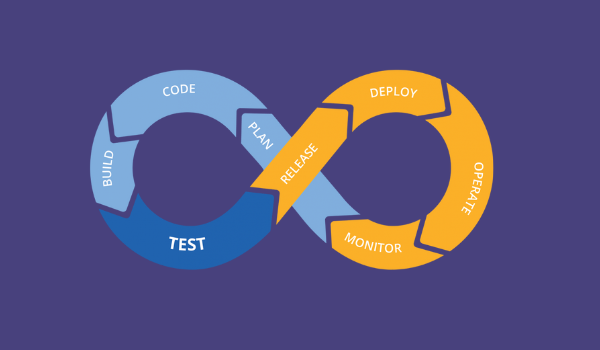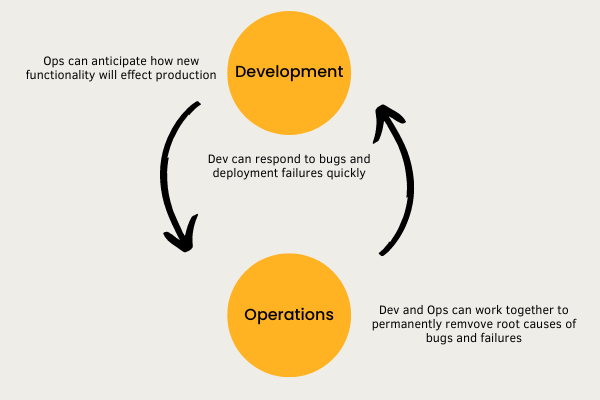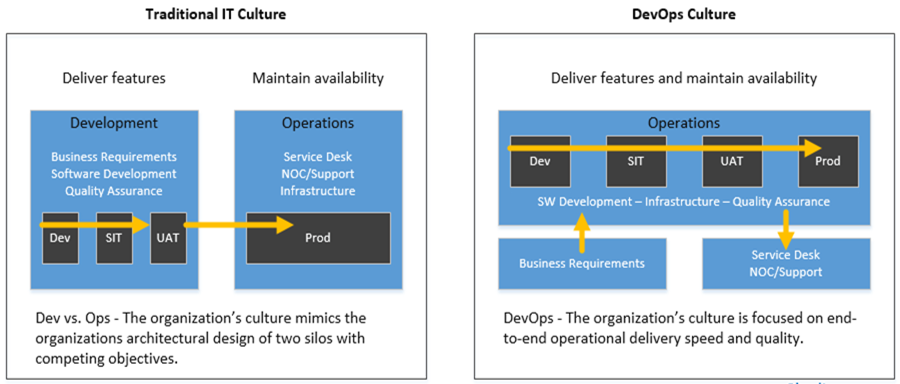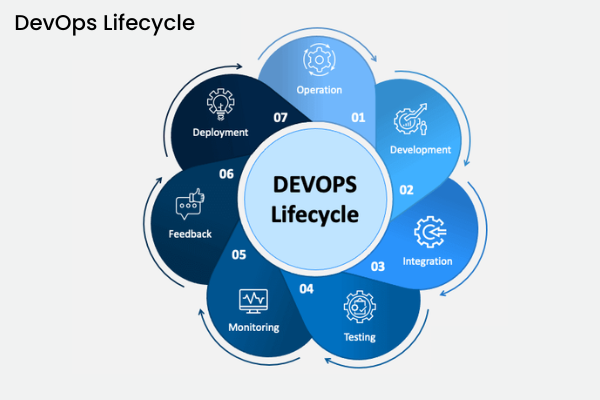Digitalization is the truth of today’s time. It is abundantly clear that to survive, companies need improved functions. Hence, the pandemic only cemented the position of DevOps in today’s world.
To the uninitiated, DevOps is a combination of cultural philosophies, tools, and practices that help improve the quality and speed of application delivery. You do not need an in-house team, as a DevOps services company can help you attain your goals.
DevOps as a service is reaching new heights around the world. But many people are still unaware of its potential.
However, while the industry leaders were already using DevOps well before the pandemic, several companies suffered the consequences of a lack of innovation with severe losses during the same period.
Here is the loop that DevOps work on to get results:

History Lesson on DevOps
While several DevOps origin stories are floating around the internet, it isn’t exactly an all-at-once invention. The foundation for DevOps was laid a long time back, but it has only been nurtured in recent years by IT professionals in various disciplines. However, if you much, there are two primary ancestors of DevOps:
- Enterprise System Management (ESM): People who work in the initial phases of DevOps are known as system administrators. They are responsible for bringing key ESM practices to DevOps like automated provisioning, configuration management, toolchain approach, etc.
- Agile Development: DevOps is a branch of agile. It includes extending the Agile principles beyond coding to entire delivered services.
Explaining The Components of DevOps
DevOps consists of two independent factors – Development (Dev) and Operations (Ops).
The development factor is responsible for responding to bugs and deployment failures. Ops predict the consequences of adding new functionality to the production. Both Dev and Ops work together to remove the root cause of bugs and failure.

An Introduction to DevOps
Companies use DevOps technology to improve the speed of delivery of applications and help organizations serve their clients better. As already stated, DevOps is made of two words, Dev + Ops. It is essentially a culture that enables the two elements to collaborate effectively.
Why Do Companies Need DevOps?
Development and operations teams used to work in isolated environments. Moreover, testing and deployment activities were also isolated tasks, which more than doubled the project completion task.
Moreover, human errors were also a point of concern for the company. The different sectors working in isolation lowered productivity and reduced delivery time for several services.
The invention of DevOps helped amalgamate the various processes and streamline them for improved delivery time and overall functionality.
For one, DevOps helps with the quick deployment of code and improves code management as it facilitates continuous integration. Moreover, it has maximum reliability of software uptime, supports effective automation tools, and offers continuous monitoring and feedback.
With the right DevOps services company, several businesses have successfully transformed their operations for the better.
How Are Dev and Ops Different from DevOps?

DevOps Lifecycle Phases
DevOps works in a loop. It has continuous development, integration, testing, monitoring, feedback, deployment, and operations. It also has complete automation to the release process and helps organizations speed up the time to market continuously.

What are the benefits of DevOps?
- Improved Product Quality: DevOps helps improve the overall work quality, resulting in a better product.
- Better software performance: The software performance also improves with DevOps. Continuous feedback helps reduce the number of errors and, at the same time, improve the overall functionality of the service.
- Reducing Cost of Production: With DevOps, companies can significantly reduce production costs. It helps save resources that businesses can turn either into products or invest in a different direction.
- Creates a reliable infrastructure: The use of DevOps also results in a reliable infrastructure that is managed with coding.
- Improves Productivity: The most crucial reason to opt for DevOps is that it helps improve the company's overall productivity.
- Faster Deployment: Your work with DevOps is deployed quickly, which means the work speed improves.
- Faster Problem-solving: Any problem that arises during the process will receive quick feedback, and solving it will also become quicker.
- Reduces Risk: The use of DevOps also reduces risk. It helps decrease the number of defects across the products.
- More Innovation: DevOps helps detect and correct problems quickly and efficiently. Flaws are tested repeatedly through automation, allowing employees time to frame new ideas.
- Promotes Agility: Using DevOps makes businesses agile and helps improve scalability and transform your business.
Benefits of Using DevOps with Clouds
Using DevOps with Cloud is better for businesses. Here are a few benefits:
Easy Automation:
Automation is an essential part of infrastructure management. With cloud services, businesses can increase the pace of automation and make It more reliable, efficient, and robust, ultimately reducing delivery time.
Cloud Server Replication:
Cloud comes with backup services. With the technology, businesses can automate the task of launching the servers and restoring backups in different environments.
Effective Monitoring:
With DevOps, you can set up custom alarms and monitoring alerts to utilize resources more effectively.
Orchestration:
Orchestration is specialized automation that has its own defined standards. They are independent of the cloud, but you can integrate them with several leading cloud service providers.
Rapid Deployment:
DevOps also focuses on solving infrastructural problems with the latest tools by creating custom login and writing capabilities. It helps automate the process with a single click and builds tools that interact with the cloud services to complete tasks without errors.
Options of Cloud Services
To use DevOps, you need to choose a cloud service. However, most cloud services do support the technology. Depending on the DevOps solution company you choose, the preference for the cloud server may change. Here are the options to consider:
One of the preferences of the cloud is Amazon Web Services (AWS)
AWS is the safest cloud service platform offering a wide range of infrastructure services like database, storage, computing power, networking, etc. By using more than 175 services in AWS, Users can build scalable, complicated, and flexible applications.
AWS has 55 availability zones with 8 more on the way. One can experience AWS and do hands-on using free-tier services. Some popular clients of AWS include Netflix, Facebook, and LinkedIn.
Microsoft also offers cloud services with Azure. It is a collection of various cloud computing services, including remotely hosted and managed versions of proprietary Microsoft and open technologies.
You can use the technology to deploy, design, and manage applications through a worldwide network. It has 44 availability zones, and 12 more are in the works. Moreover, it offers a 30-day free trial for clients. Some popular clients of the tool are Samsung, HP, and Adobe.
The third biggest competitor here is Google Cloud Platform (GCP). The platform is integrated storage of live data that enterprises and developers use.
Google does offer a free trial and a flexible Pay-As-You-Go model payment plan. Some popular clients of Google Cloud are Target, Goldman Sachs, and Major League Baseball.
DevOps Service Company – Why Do Businesses Use DevOps?
Using DevOps is essential for businesses as it helps improve the overall functionality of operations. Here are the various benefits of including DevOps in your business:
Faster Deployment
DevOps help increase the deployment speed of new processes, systems, and business applications. DevOps practices improve efficiency and faster results, ensuring that development and deployment take less time.
Improve Your Customer Experience Capabilities
DevOps helps your business create proprietary solutions faster, and that helps you serve your customers better. As the speed of work increases, customer satisfaction also improves. Moreover, it helps increase revenue and profits.
Helps Improve Office Morale
The inclusion of DevOps can also help office morale. It helps improve communication and collaboration among team members. With teamwork, the quality of work also increases. A better quality of work ensures that your employees are happier with their work.
More Resources for Innovation
DevOps help streamline processes and improve efficiency, so your employees have more time to brainstorm and create new ideas. Innovation helps businesses thrive; the best companies have people just to innovate.
Faster Problem-Solving Abilities
One of the most significant impacts of DevOps is that it helps solve problems quickly. As problems can cost substantial money to companies, the longer you face the issue, means more money is spent.
Harjodh Singh Sandhu, the Vertical Head of DevOps at MoogleLabs, conducted a session to emphasize the Business Values and Advantages of DevOps. Click on the video to know details of DevOps straight from the expert’s mouth and answers to the follow-up questions that the attendees had after the presentation.
Final Thoughts
The fact is that everything needs to be faster today, especially when it comes to services. Hence, companies need to adopt DevOps. The several benefits of using DevOps and the fact that several businesses are already using the technology prove its overall efficacy. So, as a business that needs improvement, you must start using DevOps today. Hire a DevOps services company that you can collaborate with to get results faster.
